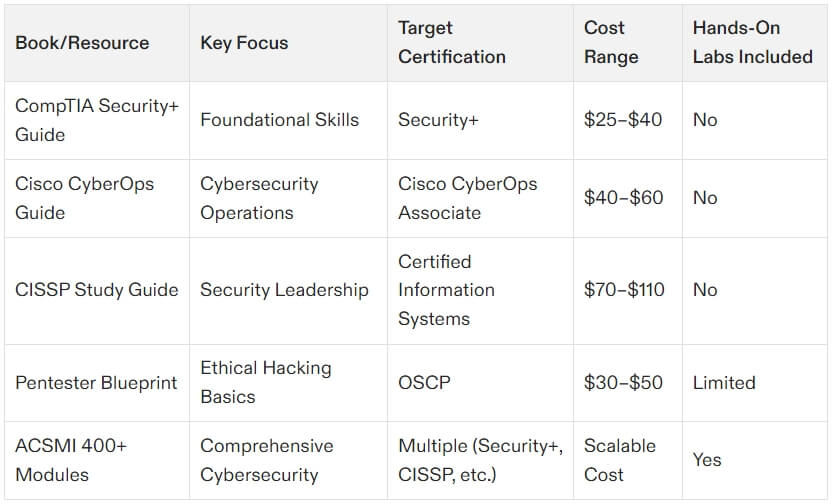Table of Contents
Whether you’re stepping into the world of cybersecurity or looking to level up your credentials, a cybersecurity certification book is an invaluable resource. These books are carefully crafted to help you both understand and prepare for essential certification exams across various disciplines in cybersecurity, from entry-level certifications to advanced expert tracks.
But with so many books available, how do you determine which ones offer the most value? And why are books still relevant when learning platforms and video tutorials dominate the tech scene?
Why Choose a Cybersecurity Certification Book?
The digital world is in a constant state of evolution, marked by the emergence of new threats and defensive measures. While online courses and practical labs have their strengths, a cybersecurity certification book serves as the backbone of foundational and test-specific knowledge.
Books provide an in-depth, structured way to learn, helping readers understand technology, apply concepts, and troubleshoot problems effectively. Here’s why these books hold a significant value in the preparation process.
Benefits of Cybersecurity Certification Books
-
Detailed Content for All Skill Levels:
Books cater to beginners eager to learn the basics as well as professionals preparing for exams like CISSP, CompTIA Security+, and CEH. -
Comprehensive and Focused Study Material:
Unlike some courses that may skim over topics, books often ensure every domain is systematically covered. -
Portability and Accessibility:
With physical or digital copies, you can prepare for certifications anywhere, anytime, without being reliant on stable internet connectivity. -
Authoritative Sources:
Many books are authored or endorsed by industry experts and certification bodies, ensuring students receive accurate, reputable content.
Books are also an excellent supplement to dynamic learning modules like ACSMI’s self-paced certification courses. Explore their in-depth training here.
Cybersecurity Certification Book Recommendations
1. CompTIA Security+ Study Guide
Author: Mike Chapple and David Seidl
Tailored for beginners, this book dives into exam topics covered under the CompTIA Security+ certification, including identity access management, risk mitigation, and cryptography.
Why It’s Worth It:
- Exam-focused format
- Real-world application scenarios
2. Cisco Certified CyberOps Associate 200-201 Official Cert Guide
Author: Omar Santos
Specially written for those pursuing cybersecurity operations careers, this book equips learners with skills in IT forensics and incident response.
Why It’s Worth It:
- Official Cisco-supported material
- Practice questions and scenarios
3. CISSP Official Study Guide
Author: James M. Stewart, Mike Chapple, and Darril Gibson
Catering to professionals seeking leadership roles, this book covers advanced domains like asset security, security engineering, and risk management.
Why It’s Worth It:
- Comprehensively maps the CISSP Common Body of Knowledge (CBK)
- Perfect for exam prep and beyond
4. The Pentester Blueprint
Author: Phillip L. Wylie and Kim Crawley
For budding penetration testers, this book lays out the roadmap for breaking into ethical hacking careers while focusing on certifications like OSCP.
Why It’s Worth It:
- Hands-on approach
- Addresses both technical and soft skills
5. ACSMI 400+ Modules Resource Library
While not a traditional book, ACSMI’s certification preparation materials follow a modular, book-like structure, allowing students to work through fundamental and advanced concepts. It covers everything from security basics to specialized knowledge for certifications such as CEH, OSCP, and CISSP.
Explore ACSMI’s multi-module certification programs here.
How Books Complement Other Learning Avenues
Pairing a cybersecurity certification book with other resources can significantly enhance your learning. For example, while books provide theoretical knowledge, labs and simulations offer hands-on experience.
Programs like ACSMI combine the two by offering students access to world-class course materials and practice exams via interactive modules. This approach ensures a 360-degree understanding of certification requirements.
Here are key ways books add value when combined with platforms like ACSMI or hands-on training sessions.
1. Reinforcing Core Concepts
Books often have detailed explanations, illustrations, and expanded definitions, which complement practical labs.
2. Exam Preparation
Reviewing books designed for specific certifications works as an excellent supplement to mock exams or live classes.
3. Offline Flexibility
Books allow candidates to learn anytime without relying on internet-based resources.
(FAQs) About Cybersecurity Certification Books
1. Are books alone sufficient to pass cybersecurity certifications?
Books are crucial for exam preparation but should ideally be supplemented with hands-on training, practice labs, and mock exams offered by platforms like ACSMI. This combination ensures theoretical and practical knowledge needed to excel.
2. Where can I find books tailored for certifications like CompTIA or CISSP?
Books for mainstream certifications are available from reputable publishers like Wiley or directly from certification bodies like CompTIA. Additionally, ACSMI’s modules provide online book-like learning structures for a flexible and streamlined approach.
3. Are physical books better than eBooks?
Both have unique advantages. Physical books provide focus by eliminating screen distractions, while eBooks offer portability and quick search functionality, making them ideal for studying on the go.
4. What is the cost of a typical cybersecurity certification book?
The price depends on the certification level. Entry-level books like Security+ guides range from $20–$80, while advanced books for CISSP or CEH can cost upwards of $100.
5. Are the ACSMI materials like certification books?
Yes, ACSMI’s modules are structured similarly to certification books. They cover extensive learning paths in well-organized, digestible formats, designed for both certification preparation and real-world applicability.
6. Can I pass a beginner certification with just books?
Yes, many beginner-friendly books like the CompTIA Security+ Study Guide provide comprehensive preparation for entry-level exams. However, pairing books with practice labs or ACSMI’s interactive modules boosts practical understanding.
7. Do certification books get updated regularly?
Reputable books are updated frequently to reflect significant syllabus changes or exam format revisions made by certification providers, ensuring your material stays relevant.
8. How do I choose the right cybersecurity certification book for my needs?
Select a book based on your current knowledge and certification goals. Beginners should opt for resources like the Security+ Guide, while seasoned professionals may require advanced books such as CISSP study materials. Assess your learning style—detailed theoretical explanations vs. exam-focused formats—and always check for updates to match the latest exam objectives.
Informative Comparison
Final Thoughts
A cybersecurity certification book provides more than just exam preparation; it delivers a foundation of knowledge critical for success in securing and evolving one’s IT career. From beginners seeking to learn the basics to seasoned professionals preparing for advanced certifications, these books are indispensable for mastering cybersecurity essentials.
When complemented by interactive modules, practice labs, and hands-on exercises from platforms like ACSMI, books can help students achieve well-rounded expertise. By utilizing the best of both worlds, learners ensure they’re not just certification-ready but also equipped for real-world challenges.
Explore ACSMI’s unmatched certification modules and start building your future today.


Leave a Reply